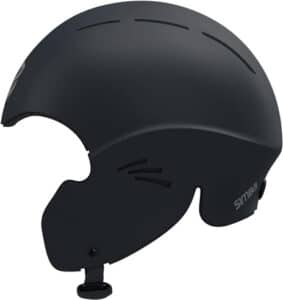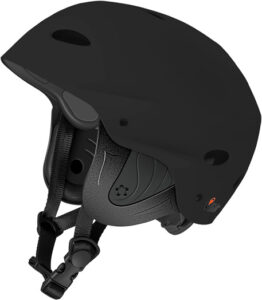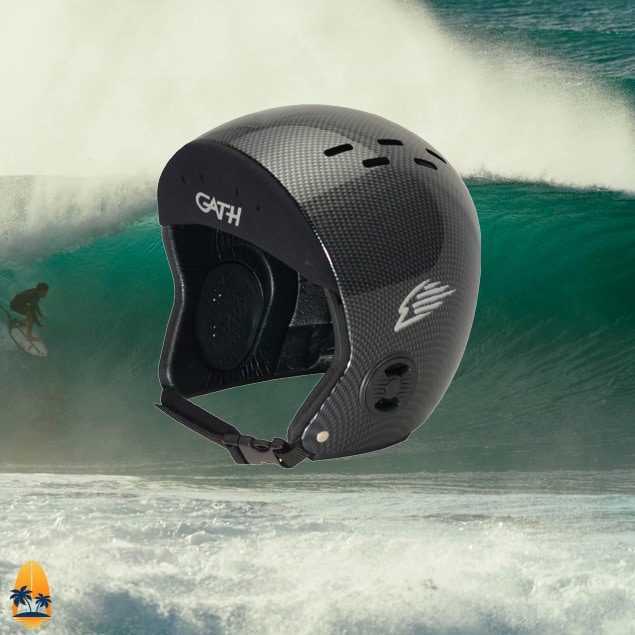Surfing is fun and exciting, but it can be risky. In this post, we will talk about why more surfers are wearing helmets, the benefits of helmets, and tips on choosing and taking care of them. Let’s dive into the question, do surfers need to wear helmets?
Understanding the Risks: Common Surfing Injuries
Surfing, as gnarly as it is, comes with some dangers. Here are a few risks that surfers face:
Wipeouts: Surfers can fall off their boards when when things don’t go right. When you fall, you might hit the water hard or even crash into your board while the wave keeps on going.
Collisions: Sometimes, a surfer might bump into another surfer, hit rocks, or get snagged by trash in the water. These collisions can lead to cuts or bruises.
Head Injuries: One of the most serious risks is hurting your head. A hard fall or a bad collision can lead to a concussion or even a skull fracture.
Understanding these risks is the first step in taking steps to protect yourself while surfing.
The Growing Trend: Surfers Wearing Helmets
In recent years, more surfers have started wearing helmets. This change in behavior shows that people are becoming more aware of safety. Here are some reasons why helmets are becoming more popular:
Increased Awareness: Surfers are learning about the dangers of head injuries from falls and collisions.
Better Designs: Helmets are now made with materials that work well in water. They are lighter and more comfortable than ever before.
Community Influence: As more well-known surfers wear helmets, others start to follow their example.
This trend means that many surfers now think about safety as much as they think about having fun.
Benefits of Wearing Helmets While Surfing
Helmets offer several important benefits when you are out in the water:
Protection from Impact: A good helmet can help absorb the shock if you hit your head. This means you may suffer fewer injuries if you have an accident.
Peace of Mind: When you wear a helmet, you know you have extra protection. This can help you feel more relaxed and confident while surfing.
By wearing a helmet, you make a smart choice to protect yourself while surfing.
Shop Surfing Helmets At Amazon
Reasons To Wear A Surf Helmet

Protection from Your Board: Surfboards can be dangerous. During a wipeout, a surfer’s board might hit their head. This is especially true for bigger boards or in crowded surf spots. Helmets help reduce the risk of serious head injuries.
Shielding Against Reef or Rock Injuries: In places with shallow reefs or rocky ocean floors, a fall can be especially dangerous. Helmets provide a barrier between the surfer’s head and sharp surfaces underwater.

Big Wave Surfing: Surfers tackling massive waves often wear helmets. The sheer power of big waves can toss a surfer around violently. Helmets offer extra protection when facing extreme conditions.
Safety in Crowded Lineups: In popular surf spots, the water can get crowded. Boards and people are everywhere, and collisions happen. Helmets help minimize injuries in these situations.
Confidence Booster For beginners or surfers trying new spots, wearing a helmet can make them feel safer. Feeling more secure can boost their confidence and help them enjoy the experience.
Factors to Consider When Choosing a Surfing Helmet
When picking out a helmet for surfing, think about these important factors:
Fit: The helmet should fit snugly on your head. It should not be too tight, but it also must not move around when you surf.
Comfort: Look for a helmet that feels comfortable even during long sessions in the water. Padding and adjustable straps can help improve comfort.
Durability: Your helmet should be able to withstand saltwater, sun, and impacts. Look for helmets made from high-quality, water-resistant materials.
Design: A good design means the helmet will stay in place even in choppy water or while riding big waves. Some helmets also have vents to keep you cool.
Certification: Check if the helmet meets safety standards. This can give you extra confidence in its ability to protect you.
Considering these factors can help you choose the best helmet for your surfing adventures.

How Much Do Surf Helmets Cost?
With the growing popularity of surfing and the importance of preventing head injuries, you’ll find that there is a wide range of prices for helmets.
On the high end of the scale the Sentinel Surf Helmet, pictured above is about $150.
On the low end of the scale, you can get a Vihir Adult Water Sports Helmet, that is pictured below, for about $40.

Shop Surfing Helmets At Amazon
Tips for Safely Wearing and Maintaining Surfing Helmets
Taking care of your helmet is as important as choosing the right one. Here are some simple tips:
Wear it Correctly: Always adjust the straps and fit the helmet securely on your head. Make sure it does not slide around.
Regular Checks: After each session, inspect your helmet for cracks or damage. Even a small crack can mean the helmet may not work as well.
Keep it Clean: Rinse your helmet with fresh water after surfing. This will remove salt and sand that could weaken the materials.
Store Properly: When not in use, keep your helmet in a cool, dry place. Avoid leaving it in the sun for long periods, as this can damage the materials.
Replace When Needed: Over time, helmets can wear out. Replace your helmet if it gets damaged or after a certain number of years, even if it still looks okay.
By following these tips, you can keep your helmet in good shape and continue to stay safe.
Changing Attitudes Towards Surfing Helmets
Not too long ago, many surfers thought that helmets were only for beginners or that they were not “cool.” But attitudes are changing because:
More Information: Surfers now know more about the dangers of head injuries and how helmets can help.
Pros Who Wear Helmets: Jamie O’Brien, Koa Smith, Kai Lenny, Owen Wright, Liam O’Brien, Molly Picklum, and Johanne Defray. These pros are using helmets, which makes it seem like a smart and responsible choice.
Better Styles: Helmet designs have improved. They now look better and come in different colors and styles, so you can pick one that matches your personality.
Community Support: As more people talk about safety, the surfing community as a whole is becoming more supportive of helmet use.
This shift in attitude shows that safety is becoming as important as skill and style in surfing.
Frequently Asked Questions
Do I really need to wear a helmet even if I’m an experienced surfer?
Yes! Even experienced surfers can have accidents. Helmets protect your head from unexpected falls and collisions, so they are a good idea for everyone.
How does a surfing helmet protect my head?
A surfing helmet is made to absorb shock. This means it can lessen the force when you hit your head, which helps prevent serious injuries.
How do I choose the right size and fit for a helmet?
Make sure the helmet fits snugly but is not too tight. Try it on and adjust the straps until it stays in place comfortably while you move.
Are helmets only for beginners?
No, helmets are for all surfers. Even pros wear them to reduce the risk of head injuries during falls or collisions.
How long should I use my surfing helmet before replacing it?
The life of a helmet depends on how often you use it and if it has any damage. Check it regularly for cracks or signs of wear. If you notice any damage, it’s best to replace it.
What is the best way to clean and maintain my helmet?
Rinse your helmet with fresh water after each surfing session to remove salt and sand. Store it in a cool, dry place away from direct sunlight, and inspect it for damage often.
Where can I buy a good surfing helmet?
You can find surfing helmets at local sports stores, surf shops, or online. Look for helmets that meet safety standards and have positive reviews from other surfers.
Are Surf Helmets Comfortable?
Modern surf helmets are lightweight, durable, and designed to stay put, even in rough conditions. Many have drainage holes, so they don’t fill with water, and adjustable straps to ensure a snug fit. They might feel a little odd at first, but most surfers get used to them quickly.
Shop Surfing Helmets At Amazon
Should You Wear a Helmet When Surfing?
In my honest opinion, YES! Surfers SHOULD wear a helmet when surfing. There is a pretty good risk of banging your head on your surfboard, someone else’s board, rocks, and the ocean floor. Do I wear a helmet when surfing? Sadly, I don’t, even though I know I should. It must sound hypocritical to say you should wear a helmet even though I don’t, but it is what I believe we should all do.
Whether or not to wear a helmet depends on where and how you surf. If you’re surfing near reefs, in crowded lineups, or tackling large waves, a helmet could be a smart choice. Beginners might also consider one for peace of mind.
Conclusion: Do Surfers Need To Wear Helmets?
Surfing is all about adventure and enjoying the ocean, but safety should always come first. Helmets are an easy and effective way to protect your head. By understanding the risks, choosing the right helmet, and taking good care of it, you can reduce the chance of serious injuries. Remember:
Always be aware of the risks involved in surfing.
Consider wearing a helmet to protect yourself.
Choose a helmet that fits well and meets safety standards.
Take care of your helmet with regular cleaning and proper storage.
By making safety a top priority, you help create a safer surfing community for everyone. Enjoy the waves, and stay safe out there!
Have you ever worn a surf helmet or thought about using one? Share your thoughts in the comments!


